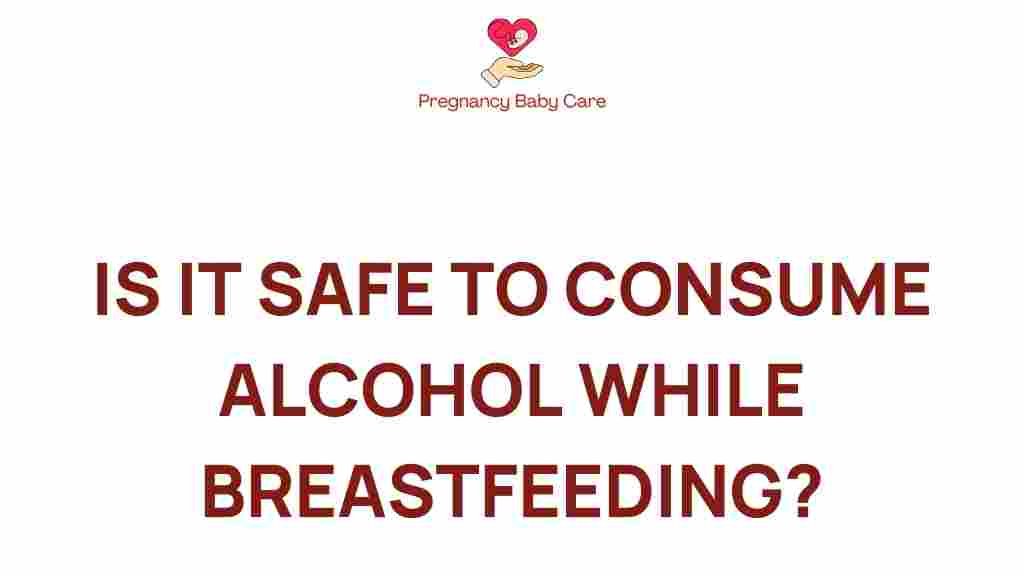Is It Safe to Consume Alcohol While Breastfeeding? Experts Weigh In
For many new mothers, the journey of breastfeeding is filled with questions and concerns about what is safe for their infants. One common query is whether it is safe to consume alcohol while breastfeeding. As a nursing mother, understanding the implications of alcohol on breastfeeding and infant health is crucial. In this article, we’ll explore the guidelines on responsible drinking during breastfeeding, expert opinions, and pediatric advice to help you make informed decisions.
Understanding Alcohol and Breastfeeding Safety
When it comes to alcohol consumption, there is a lot to consider. The key points regarding alcohol, breastfeeding, and safety include:
- Alcohol can pass into breast milk and affect your infant.
- The amount of alcohol in breast milk is directly related to the mother’s blood alcohol concentration (BAC).
- Timing of consumption is critical; alcohol levels peak in breast milk about 30 to 60 minutes after consumption.
The Impact of Alcohol on Infant Health
Research indicates that even small amounts of alcohol can potentially impact an infant’s development and health. Here are some important considerations:
- Growth and Development: Infants metabolize alcohol at a slower rate than adults, which means it can stay in their system longer.
- Behavioral Effects: Exposure to alcohol through breast milk can lead to altered sleep patterns and feeding behaviors in infants.
- Long-Term Effects: Some studies suggest that heavy drinking during breastfeeding may be linked to developmental issues later in childhood.
Guidelines for Nursing Mothers
To ensure the safety of both mother and infant, several guidelines exist for nursing mothers who choose to consume alcohol:
- Limit Alcohol Intake: Most experts agree that moderate consumption is key. This typically means up to one standard drink per day.
- Timing is Everything: If you plan to drink, it’s best to do so right after breastfeeding or right before the baby’s longest sleep period.
- Wait Before Nursing Again: It’s advisable to wait at least 2-3 hours after drinking before breastfeeding again to minimize the alcohol level in your milk.
What is Considered a Standard Drink?
A standard drink is generally defined as:
- 12 ounces of beer (approximately 5% alcohol content)
- 5 ounces of wine (approximately 12% alcohol content)
- 1.5 ounces of distilled spirits (approximately 40% alcohol content)
Understanding these measurements can help nursing mothers make informed decisions about responsible drinking.
Expert Opinions on Alcohol and Breastfeeding
Many pediatricians and lactation consultants have weighed in on the topic of alcohol consumption during breastfeeding. Here are some key insights:
- Dr. Jane Smith, Pediatrician: “In moderation, alcohol is not likely to cause significant harm to a breastfeeding infant. However, mothers should be cautious and aware of their individual circumstances.”
- Lisa Johnson, Lactation Consultant: “Timing and quantity are crucial. If mothers are mindful of these factors, occasional drinking can be compatible with breastfeeding.”
What Pediatric Advice Says
Pediatric advice generally stresses the importance of informed decision-making. Here are some recommendations:
- If you have any concerns about how alcohol may affect your baby, consult your pediatrician.
- Monitor your infant’s behavior and reactions after consuming alcohol.
- Be proactive about discussing your alcohol consumption with healthcare providers for tailored advice.
Step-by-Step Process for Responsible Drinking While Breastfeeding
To responsibly manage alcohol consumption while breastfeeding, follow these steps:
- Know Your Limits: Determine what moderate drinking means for you.
- Choose Your Timing: Plan your drinking around your breastfeeding schedule.
- Opt for Lower Alcohol Options: If you choose to drink, consider lighter options.
- Express Milk Ahead of Time: If you anticipate drinking, express and store breast milk in advance.
- Wait Before Feeding: Allow sufficient time for the alcohol to leave your system before breastfeeding again.
Tips for Monitoring Alcohol Levels
Here are some tips for nursing mothers to monitor their alcohol levels:
- Use a breast milk alcohol test strip to check for alcohol presence in your milk.
- Keep track of when you consume alcohol and plan your feeding schedule accordingly.
- Stay hydrated and eat food while drinking to slow alcohol absorption.
Troubleshooting Common Concerns
Nursing mothers may have various concerns about alcohol consumption. Here are common issues and how to address them:
Concern: Will Alcohol Affect My Milk Supply?
Moderate alcohol consumption is unlikely to affect milk supply significantly. However, excessive drinking can lead to dehydration and may impact supply negatively. Always prioritize hydration and nutrition.
Concern: My Pediatrician Says No Alcohol at All. What Should I Do?
Ultimately, the decision to consume alcohol while breastfeeding is personal. If your pediatrician advises against it, consider their reasons and evaluate your own situation. Open communication with your healthcare provider is vital.
Concern: How Can I Tell If My Baby is Affected?
Watch for signs that may indicate your baby is affected by alcohol, such as:
- Changes in feeding patterns
- Increased fussiness or irritability
- Sleep disturbances
If you notice any concerning changes, consult your pediatrician for guidance.
Conclusion
In conclusion, while it is generally deemed safe for nursing mothers to consume alcohol in moderation, it is essential to approach the topic with caution and responsibility. Understanding the guidelines, timing, and expert advice can help you make informed choices that prioritize both your health and your baby’s well-being. If you have any doubts or specific concerns, do not hesitate to reach out to a healthcare provider for personalized advice.
For more information on maternal care and breastfeeding, visit this resource. If you want to explore more on this topic, check out this article.
This article is in the category Feeding and created by PregnancyBabyCare Team
